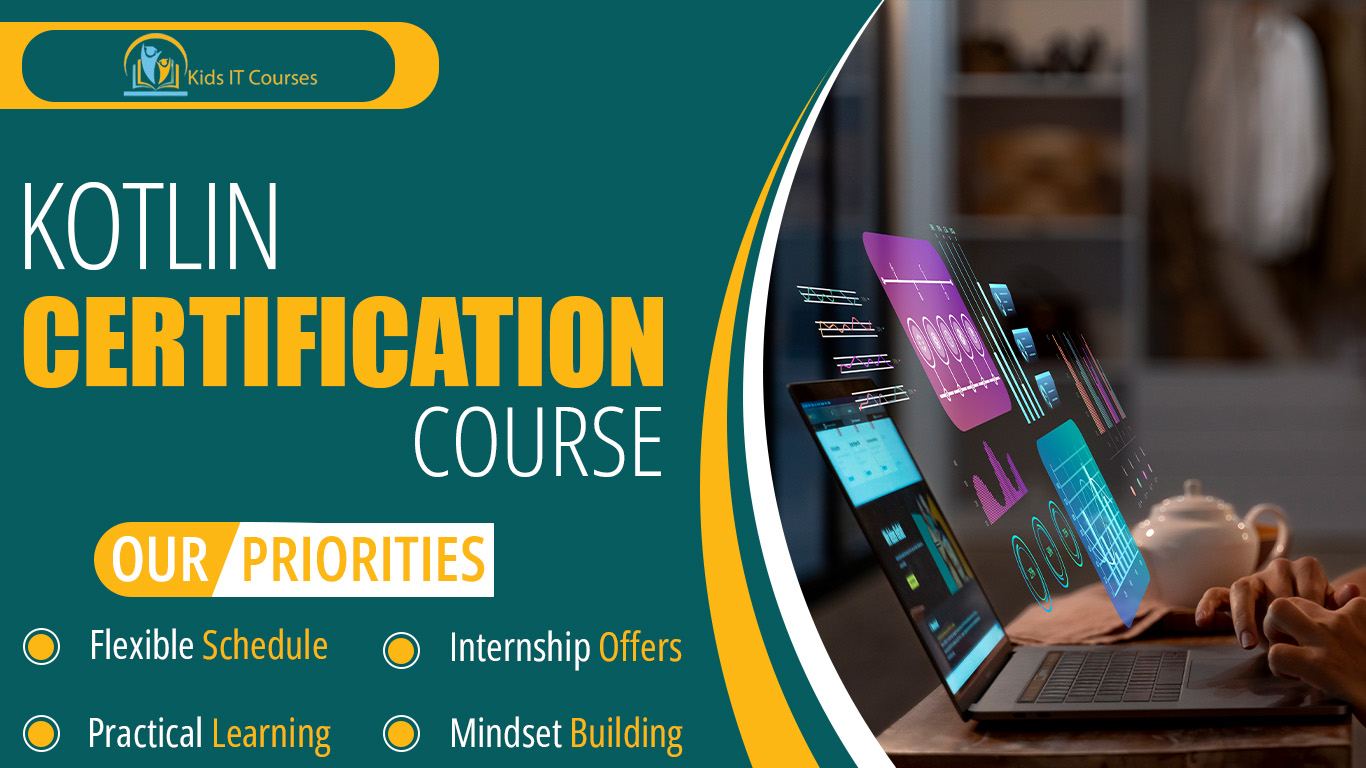
Kotlin Course for Kids
Definition
• KOTLIN is a fun and easy language for kids to learn coding. It helps them build apps and games step by step.
• Kids learn how apps on Android phones are made. KOTLIN is the main tool for that!
• KOTLIN code is simple to read and write. It helps kids understand what their program is doing.
• Kids solve small tasks using code blocks. This grows their smart thinking and focus.
• They can create mini-games, quiz apps, or story apps. Seeing their code come to life is super fun!
•Big companies use Kotlin to build real apps. Learning it early gives kids a head start in tech careers.
Importance
• Kotlin is used to build apps for Android phones. Kids can create fun and useful apps on their own!
• Kotlin has clean and simple rules. It’s a good language for beginners who are new to coding.
• Big companies like Google use Kotlin. Learning it early gives kids a head start in tech.
• They can make simple games, quizzes, and tools. It’s fun to see their ideas come to life!
• App development is a great skill for tomorrow. Kotlin helps kids get ready for exciting careers!
Advantages for Freelancing
• Kotlin uses simple words and clear rules. Kids can learn it without getting confused.
• Kotlin is used to build apps for Android phones. Kids can create their own fun and useful mobile apps!
• They learn how to solve problems step by step. This boosts their logic and brainpower.
• Kotlin code is not too long or messy. Kids can write less and do more!
• Big companies use Kotlin in real apps. Kids learn a language used in real jobs.
• Kotlin can work together with Java easily. It helps kids understand both coding languages.
Session 1 : What is Kotlin?
- Introduction to Kotlin as a modern programming language
- Real-life example: Writing apps for Android using Kotlin
- Why Kotlin is preferred over Java for new Android projects
- Setting up Kotlin on your computer using IDEs like IntelliJ or Android Studio
Activity: Write and run your first “Hello, Kotlin!” program
Session 2 : Variables, Data Types & Operators
- Declaring variables using val and var
- Understanding basic data types: Int, String, Boolean, etc.
- Real-life example: Storing user information in an app
- Using operators for math and logic
- Activity: Create a small program to collect and display user data
Session 3 : Control Flow – Making Decisions
- Using if, else, when statements
- Loops: for, while, do-while
- Real-life example: Checking login input or calculating quiz results
- Activity: Build a simple decision-making calculator
Session 4 : Functions and Parameters
- Defining and calling functions
- Using parameters and return values
- Real-life example: Creating a function to calculate BMI or score
- Activity: Write reusable functions and call them from main()
Session 5 : Classes and Object-Oriented Concepts
- Understanding classes, objects, and constructors
- Real-life example: Defining a class for users, books, or products
- Introduction to inheritance and interfaces
- Activity: Create and use your own class in a Kotlin program
Session 6 : Collections and Data Handling
- Arrays, Lists, Maps, and Sets
- Real-life example: Managing a to-do list or contact list
- Looping through collections and modifying them
- Activity: Build a contact manager using collections
Session 7 : Null Safety and Error Handling
- Understanding nullable types and the safe call operator
- Try-catch blocks and exception handling
- Real-life example: Handling user input or API errors gracefully
- Activity: Write a program that handles user errors without crashing
Session 8 : Kotlin for Android Basics
- Using Kotlin to build basic Android apps
- Real-life example: Creating a simple calculator or greeting app
- Exploring Android Studio layout and Kotlin integration
- Activity: Build your first Android app using Kotlin
Bonus Materials
- Kotlin syntax cheat sheet and shortcuts
- Real-world mini projects (BMI calculator, quiz app, to-do app)
- Free resources and IDE installation guides
- Certificate of Completion for Kotlin Programming
